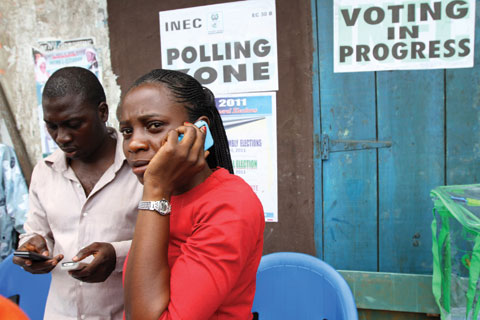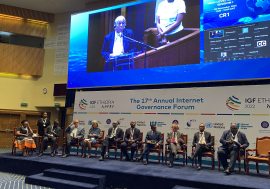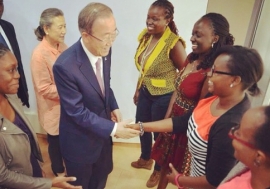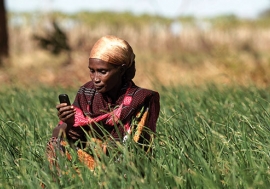Africa Wired
Africa Wired
 An electoral officer in a Lagos neighbourhood during the April 2011 elections in Nigeria: Candidates, voters and election monitors all used social media to an unprecedented extent during the polling.
An electoral officer in a Lagos neighbourhood during the April 2011 elections in Nigeria: Candidates, voters and election monitors all used social media to an unprecedented extent during the polling.In 2008, then US presidential candidate Barack Obama broke new ground by using social media in ways never seen before. Yet it was Goodluck Jonathan, the recently elected president of Nigeria, who took the extraordinary step of announcing his bid for the highest office on Facebook. On Wednesday, 15 September 2010, he informed his 217,000-plus fans on the world's most popular networking platform of his intent. Twenty four hours later, 4,000 more fans joined his page. By the day of the election, on 16 April 2011, he had over half a million followers.
Mr. Jonathan's online campaign was only one illustration of the social media fever that gripped Africa's most populous country (with around 150 million people) during its most recent presidential, parliamentary and local elections. A report by two researchers who helped track online traffic during the month-long polls argues that the country's use of social media reached unprecedented levels.* "Nigeria set a new record for recent African elections in the number of reports tracked using social media," it says. In addition to the approximately 3 million registered Nigerians on Facebook and 60,000 on Twitter, almost every institution involved in Nigeria's elections conducted an aggressive social networking outreach, including the Independent National Electoral Commission (INEC), political parties, candidates, media houses, civil society groups and even the police.
The report notes that between 10 March and 16 April 2011, the electoral commission posted almost 4,000 tweets, many in response to voter queries. Using Twitter, commission officials at polling stations around the country also were able to communicate among themselves, and even confirmed the death of one of their members who had been attacked. "Twitter ultimately proved to be the most efficient way to interact with INEC," the document authors report. The commission's use of social media led to its website receiving a record 25 million hits in three days during the presidential election. "By using social media to inspire voters, the electoral commission has redefined elections in Nigeria," analyzed Punch, the country's most circulated newspaper.
The boom in use of social media during elections also helped the media expand their readerships. Shortly before the polls, the Daily Trust newspaper had 32,000 fans on Facebook. A few weeks later, the number had more than doubled to 65,000, placing its online reach beyond its print distribution of 50,000. To build up its fan base, the newspaper also used social media in its reporting. Journalists solicited and used questions from Facebook fans for interviews with the chairman of INEC. Since the elections, the Daily Trust has further increased its Facebook presence, with 95,000 fans by July 2011.
The online networking platforms reflected popular interest. Unsurprisingly, social media use reached its peak during the presidential election on 16 April. On that day, a total of 33,460 text messages and 130,426 posts on Twitter and Facebook were sent by some 65,000 voters.
The content was mixed, the authors point out. "Social media, especially Twitter, was used to report occurrences [of fraud] — truthful as well as fabricated." Yet, they add, it played a mostly constructive role during the post-election violence by exposing unfounded rumours.
"Social media tools," the report concludes, "revolutionized the efficiency of election observing by increasing coverage and reporting, while minimizing costs.... They changed how information was disseminated in Nigeria. Citizens accessed information directly and more accurately, resulting in unsurpassed participation in politics during the 2011 elections."
That upbeat assessment, however, needs to be put in context: An estimated 70,000 people posted contents online during Nigeria's polls, but they were just a tiny fraction of the registered 73 million voters. Still, a new trend appears to have begun.
Ghana's cocoa farmers get advice via mobile phones
Eight thousand Ghanaian cocoa farmers in 15 communities are currently receiving practical information through mobile telephones on "farming practices, farm safety, child labour, health, crop disease prevention, post-harvest production and crop marketing," reports the Australia-based agricultural website Ausfoodnews.
Launched by the World Cocoa Foundation (WCF), the Ghana Cocoa Board (Cocobod) and the Hershey Company, the programme, called "CocoaLink," allows farmers to receive information from the WCF in local languages by voice mail or text messaging, as well as prompt responses to enquiries. If the pilot phase is successful, an estimated 100,000 of the country's 700,000 cocoa farmers will ultimately benefit. "The programme offers an innovative, yet simple, way to get critical information to cocoa farmers," says Anthony Fofie, the head of Cocobod, which oversees and supports the programme.
Some 65 per cent of Ghana's rural people use phones (compared with the national rate of 85 per cent). In May, Deputy Minister of Communications Ernest Attuquaye Armah urged greater use of information and communications technologies to enhance the quality of life in rural areas.
Africa's mobile advertising up
In the three months to June 2011, Africa's mobile advertising market grew by 21 per cent, according to the world's largest independent mobile advertising network, InMobi. The firm says advertisements sent to subscribers on the continent were viewed 4.2 billion times per month. These views (also known as impressions) were up from 3.5 billion in January 2011. South Africa is the largest national mobile advertising market, with 946 million impressions a month, 24 per cent of the continent's total. Nigeria and Egypt come next. With almost half of the 1 billion Africans using mobile phones, the firm says that the sector "is now a must-buy media for major brands looking to grow their business on the continent."
The growth of mobile advertising is set to continue with the use of faster broadband connections. Informa Telecoms & Media, a consulting company, predicts that broadband subscriptions, currently standing at 12 million, will hit 265 million by 2015.
Such numbers and predictions seem to confirm views from those who see Africa fast becoming a powerhouse for mobile technology. Already, the continent represents over 10 per cent of all mobile subscribers worldwide.
Kenya government launches ‘open data’ website
Kenyan President Mwai Kibaki inaugurated his government's "open data" website in Nairobi on 8 July. The site, which offers citizens access to a wide variety of official statistics on health, education, public spending and other development and policy priorities, is said to be the first of its kind in Africa.
The site is intended to make government more efficient and transparent, officials told reporters, and support Kenya's emergence as a leader in the booming African information technology industry. In addition to user-friendly maps, graphs and charts of commonly sought information, the site also provides raw data for programmers and analysts, who are invited to design their own software applications for the material.
Kenyan software engineers and entrepreneurs were quick to realize the potential of Africa's enthusiastic embrace of mobile telephones. Kenyan designers have won high praise for such products as the popular M-Pesa cell phone banking service and the Ushahidi citizen reporting system that has been used to monitor elections, document political violence and locate earthquake survivors in Haiti.
Mobile telephone subscriptions in Africa have nearly quadrupled since 2005 to over 360 million, and African software engineers are competing to develop phone-based access to health, education, farming and government services. Industry analysts expect strong growth in the African mobile market to continue.
* Tracking Social Media: The Social Media Tracking Centre and the 2011 Nigerian Election, Shehu Musa Yar'Adua Foundation.



















